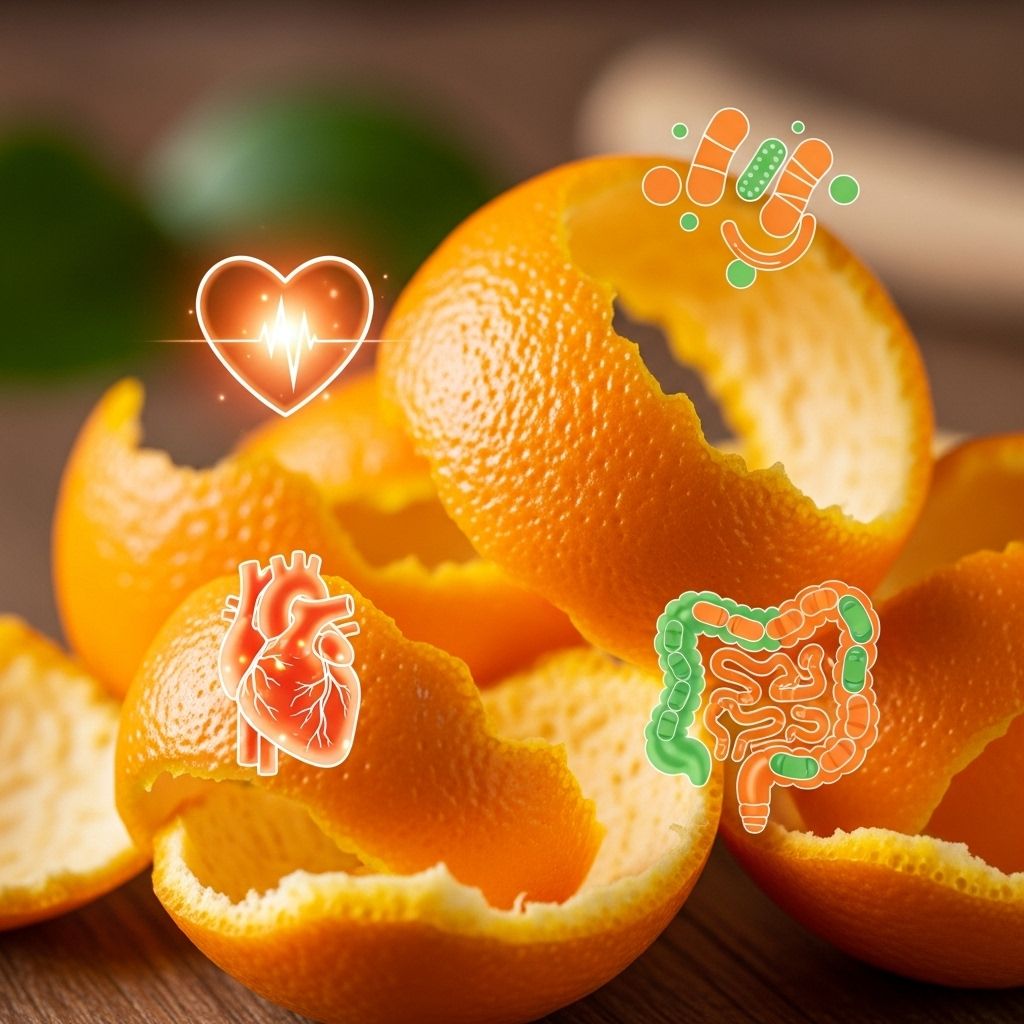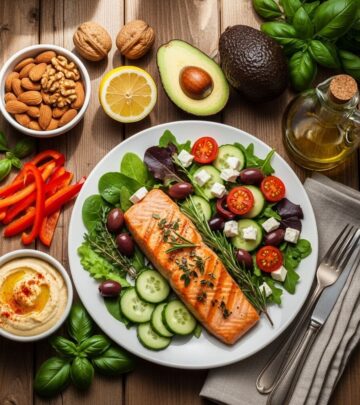How Orange Peels Could Support Your Gut and Heart Health
Discover why compounds in orange peels may improve gut microbiota and reduce heart disease risk, based on new research.

Emerging research suggests that orange peels—a common byproduct of orange juice production—may offer significant health benefits. Scientists have recently uncovered how specific compounds derived from orange peels could enhance gut health and reduce markers linked to cardiovascular disease risk. This article explores the latest findings, how orange peels impact the gut microbiome, and what this might mean for your heart and digestive wellness.
The Link Between Your Gut Microbiome and Cardiovascular Health
In the past decade, scientists have made tremendous strides in understanding the gut microbiome—the trillions of bacteria living in our digestive tract. A healthy microbiome is associated with improved digestion, better immunity, and even reduced risk of chronic diseases, including cardiovascular disease (CVD).* The adage “you are what you eat” rings especially true as researchers discover specific foods can alter the microbiome in ways that affect cholesterol metabolism and inflammation.
One emerging area of research focuses on how gut bacteria transform certain nutrients into bioactive molecules. Some of these, such as trimethylamine N-oxide (TMAO), have been linked to increased heart disease risk.
- Gut microbiome health is strongly tied to cardiovascular well-being.
- Foods high in fiber, antioxidants, and polyphenols (including many fruits and vegetables) generally promote a healthier gut ecosystem.
What Is TMAO and Why Does It Matter?
Trimethylamine N-oxide (TMAO) is a byproduct created when gut bacteria metabolize certain precursors found in animal products such as red meat and dairy. Elevated TMAO levels in the bloodstream are associated with:
- Increased risk of atherosclerosis (hardening of the arteries)
- Greater likelihood of major adverse cardiovascular events, including heart attacks and strokes
- Disruption of normal cholesterol metabolism
Because TMAO is produced through a multi-stage process involving both gut bacteria and the liver, modifying what we eat might help manage our TMAO levels and, by extension, heart disease risk.
Why Focus on Orange Peels?
Oranges are a nutritional powerhouse, well-known for their high vitamin C, potassium, fiber, and a range of beneficial antioxidants and polyphenols. But what about the peel—usually discarded during juice production?
- Most Florida oranges are processed into juice, with peels considered waste or occasionally used for livestock feed.
- Researchers have long wondered if valuable nutrients and compounds might remain in the peels, awaiting discovery and potential health uses.
New Research: Orange Peel Extract and Heart Health
Recently, a team from the University of Florida investigated how extracts from orange peels might affect TMAO production and cardiovascular risk. Their study, published in the Journal of Agricultural and Food Chemistry, examined two types of orange peel extracts:
- Orange Peel Polar Fraction (OPP)
- Orange Peel Nonpolar Fraction (OPNP)
The difference between these fractions lies in their chemical solubility—polar components are water-like, while nonpolar ones are more oil-like. The researchers wanted to establish whether either extract could reduce production of TMA (the direct precursor to TMAO) and TMAO itself.
| Type of Extract | Main Characteristic | Effectiveness in Study |
|---|---|---|
| Orange Peel Polar Fraction (OPP) | Water-soluble bioactives | Most effective at reducing TMA and TMAO |
| Orange Peel Nonpolar Fraction (OPNP) | Oil-soluble bioactives | Less effective |
The OPP extract was superior at lowering TMA and TMAO in both blood and urine, in an animal study involving male mice.
A Closer Look: How Orange Peel Compounds Work Against TMAO
The secret behind the efficacy of orange peel extracts may lie in a compound called feruloylputrescine. Researchers found this compound in higher concentrations in the OPP, the more successful extract. It inhibits an enzyme (cntA/B) essential for TMA production from dietary nutrients in the gut. Blocking this enzyme halts the chain reaction leading to TMAO formation and, potentially, related cardiovascular risks.
- Feruloylputrescine: Inhibits TMA-producing enzyme, lowering TMA, and downstream TMAO.
- Presence higher in OPP than OPNP extracts.
This scientific breakthrough highlights the powerful interactions between what we eat, our gut microbes, and metabolic pathways influencing health over a lifetime.
Orange Peels, Digestive Benefits, and Microbiome Support
Besides affecting TMAO production, orange peels naturally contain compounds that support a thriving gut ecosystem:
- Fiber: Acts as a prebiotic, providing fuel for beneficial gut bacteria.
- Antioxidants and Polyphenols: Counteract inflammation, support healthy gut lining, and may reduce pathogenic bacteria.
- Vitamin C, B vitamins (like folate), and potassium enrich gut and overall well-being.
When beneficial microbes ferment the peel’s fiber, they create byproducts that either support health or help remove undesirable compounds, such as TMAO and cholesterol. Thus, orange peels might offer a multi-pronged benefit for digestive and cardiovascular systems.
Environmental Impact: Reducing Food Waste with Functional Nutrition
Globally, orange juice manufacturing produces massive amounts of peel waste. Repurposing these peels for health-promoting extracts could tackle two challenges simultaneously:
- Minimize agricultural and food processing waste
- Create high-value nutritional supplements or additives for supporting gut and heart health
This approach embodies a circular, sustainable nutrition model—using what was formerly waste to foster better public health.
Potential Cautions and Considerations
While the data is promising, experts urge caution before individuals start adding orange peels or their extracts liberally to their diets:
- Potential Digestive Upset: Whole orange peels are tough, bitter, and hard to digest, and may cause bloating or cramps if not properly processed.
- Pesticide Residue: Peels from conventionally grown oranges can have higher concentrations of pesticides. Opting for organic produce or thoroughly washing peels is advisable if you plan to consume them.
- Drug Interactions: Compounds in orange peel and orange juice can interact with medications, especially statins, antibiotics, anti-parasitics, and beta-blockers. Consult a healthcare provider before making any changes, especially if you have chronic medical conditions.
How Can You Incorporate Orange Peels Safely?
If you’re interested in reaping the benefits of orange peel compounds, consider the following safe methods:
- Zest: Use small amounts of organic orange zest in baking, salads, or smoothies for flavor and nutrients.
- Infusions: Add washed or organic orange peels to teas, or use them as a natural flavoring in water.
- Supplements: Watch for forthcoming orange peel extracts in functional foods or dietary supplements—these will be designed to maximize bioavailability and minimize risks.
Broader Implications: Why Personalized Nutrition Matters
The orange peel study underscores the importance of personalized nutrition—tailoring dietary approaches based on genetics, gut microbiome composition, and individual health needs. As science reveals more about the complex interplay between diet, the microbiome, and metabolic health, such targeted interventions hold promise for the future of disease prevention.
Ongoing research will help clarify:
- Which compounds exert the strongest effect on human TMAO pathways
- Optimal extract formulations and dosages for health improvement
- Possible risks or downsides in various populations
Frequently Asked Questions (FAQs)
Q: Can eating whole orange peel provide the same benefits?
A: While orange peels have beneficial compounds, consuming them whole is not advisable due to potential digestive discomfort and pesticide residue. Proper extraction as done in studies is needed to isolate and deliver the most effective bioactive components.
Q: Is orange peel extract available as a supplement?
A: As of now, orange peel extracts studied for gut health and TMAO reduction are not widely available as supplements, but future products are likely as research advances.
Q: Are there risks in consuming orange peel or its extract?
A: Yes. Orange peels may be tough to digest, can cause gastrointestinal upset, and could interact with certain medications. Always check with a healthcare professional before trying new supplements or consuming significant quantities of peel.
Q: What other foods support gut microbiome health?
A: Other gut-supporting foods include leafy greens, berries, legumes, and seeds such as chia. Diverse, plant-based diets seem to offer the most benefit to gut microbiome diversity and health.
Q: How can this research change heart disease prevention?
A: If further studies confirm the benefits of orange peel extracts in humans, functional foods or targeted nutritional interventions may become new tools for reducing heart disease risk through microbiome modulation.
Key Takeaways
- Orange peel extracts, especially the polar fraction, may help inhibit compounds linked to heart disease by acting on the gut microbiome.
- These benefits stem from unique compounds, particularly feruloylputrescine, capable of blocking TMA (and thus TMAO) production.
- Utilizing orange peel waste as a functional food ingredient demonstrates an innovative approach to both health and sustainability.
- Practical consumption involves safe use—small amounts of zest, infusions, or future supplements, taking into account possible interactions and digestive tolerance.
- These findings add to the growing case for personalized nutrition strategies that account for individual microbiome differences.
Please consult your healthcare provider before making significant dietary changes or attempting to use orange peel for health purposes, especially if you have underlying health conditions or take medication.
Read full bio of medha deb












